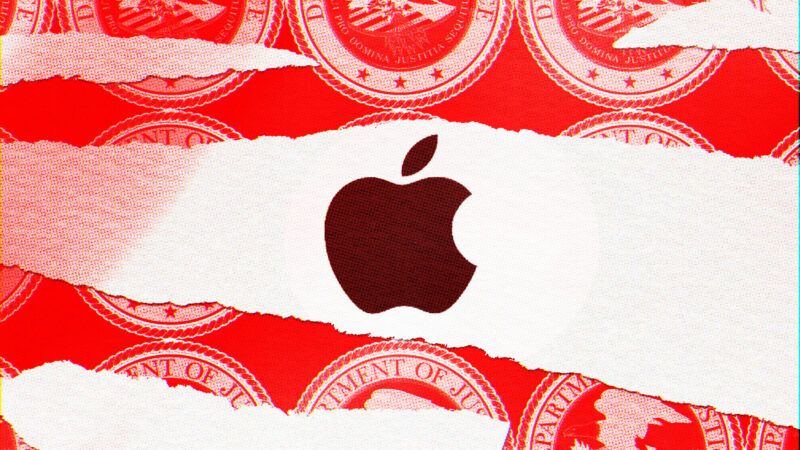The DOJ's Assault on Apple Will Harm Consumers
Sen. Rand Paul writes that the lawsuit punishes Apple for a feature its customers like.

In America, we do not punish businesses for their success. We certainly do not punish businesses because their competitors are struggling to keep pace. Sadly, that is exactly what the Department of Justice (DOJ) is attempting to do in its recent lawsuit against Apple.
In March, the DOJ, joined by 15 states and the District of Columbia, filed a lawsuit aimed at penalizing Apple for successfully competing in the market for smartphones. However, like much of the Biden administration's approach to antitrust enforcement, the DOJ's lawsuit is focused on punishing Apple for its success rather than addressing any real harm to consumers. Instead of fostering innovation and competition, this approach threatens to stifle the very progress that benefits Americans.
In its lawsuit, the DOJ makes the unsubstantiated claim that Apple has "willfully monopolized" the smartphone market through "exclusionary" and "anticompetitive" conduct. In particular, it accuses Apple of exercising unwarranted control over the creation, distribution, and functioning of apps within the iPhone operating system.
What the complaint ignores, however, is that this control is not simply a lawful business practice by a privately held company; it is an indispensable part of Apple's business model. Far from being an "anticompetitive" practice that harms consumers, Apple's careful approach to app integration is a pro-competitive way in which it meets its users' demands.
Privacy, security, and seamless integration have been the core of Apple's operational strategy for years. Back in 2010, Steve Jobs explained that "when selling to people who want their devices to just work, we think integrated wins every time." That "open systems don't always work," and Apple was "committed to the integrated approach."
What makes Apple products so unique is their ease of use and consistency over time. While no product will ever be perfect, Apple's goal is to deliver a seamless, integrated experience that users can rely on time after time without giving it a second thought. How does Apple do this? By carefully exercising the very control that the DOJ is trying to punish. As economist Alex Tabarrok explains in Marginal Revolution: "Apple's promise to iPhone users is that it will be a gatekeeper. Gatekeeping is what allows Apple to promise greater security, privacy, usability and reliability. Gatekeeping is Apple's brand promise. Gatekeeping is what the consumer's are buying."
This control is not a sign of anticompetitive conduct, quite the opposite. It is Apple's unique approach to third-party integration that differentiates it from other smartphone providers. As the Northern District of California found in the Epic Games v. Apple case, Apple's approach "ultimately increases consumer choice by allowing users who value open distribution to purchase Android devices, while those who value security and the protection of a 'walled garden' to purchase iOS devices."
The DOJ's lawsuit is not actually about protecting consumers; iPhone users view Apple's careful integration as a feature of the platform, not a bug. Instead, it's a thinly veiled attempt to accomplish through litigation what Democrats could not get done through legislation.
In 2022, the DOJ sent several sitting senators a letter in support of the American Innovation and Choice Online Act. This legislation was aimed at prohibiting many of the very consumer welfare–enhancing practices that the DOJ is now suing Apple over. The problem: it never passed. Why? Because it is extremely unpopular among American voters.
A 2022 poll conducted by the U.S. Chamber of Commerce found that "70% of voters oppose Congressional proposals to add new antitrust regulations." Even more, when reading descriptions of the policies included in the American Innovation and Choice Online Act, 79 percent of Republicans, 72 percent of independents, and 59 percent of Democrats said they would oppose the bill.
In its lawsuit against Apple, the DOJ is trying to rehash these very same unpopular arguments that have already been rejected by the American people. Not only is this an egregious attempt to bypass the legislative process, it threatens to penalize innovation and reduce choice, ultimately harming the very people it claims to protect.
Digital markets do not need more government regulation; they need more companies willing to innovate and compete. The DOJ should not waste taxpayer-provided resources targeting a company that has earned its success through excellence in the marketplace. An Apple a day may keep the doctor away, but it seems that all of the pro-competitive justifications in the world cannot keep a politically motivated antitrust enforcer at bay.


Show Comments (31)